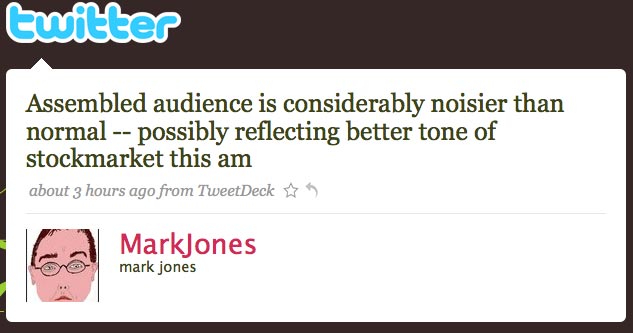“It’s good for trust in journalism to be low,” the Evening Standard’s executive editor said last night, “and we should feel like our back is against the wall”.
Taking part in the ‘What Price The News?’ debate on the ethics of modern journalism hosted by Thomson Reuters, the Evening Standard’s Anne McElvoy said that while society as a whole is less trusting, ‘it’s right for people to be skeptical’ about where their news is coming from.
Journalism will benefit, she claimed. “We’re not Mother Teresa – we don’t expect to have a high trust rating.”
Twitter ethics
The debate inevitably covered Twitter, and its value as a source of news. “Twitter was not designed to cover the world. It was designed to give a flavour of the conversation at the moment,” said Joe Lelyveld, Pulitzer prize winner and former New York Times journalist.
The panel also saw a use in ‘getting privileged information out there fast’, as with the Guardian-Trafigura case, but were wary of it becoming more than ‘just a tip-off service’ for journalists without subsequent fact checking.
BNP on BBC
While Nick Griffin sat in a BBC studio recording his appearance on the Question Time panel, the panel at Thomson Reuters considered how they would have dealt with the issue.
“It’s the responsibility of journalists in this country to report the hell out of this situation. You need to give your readers and viewers a truthful view of who this character is, and do so clearly, intelligently and aggressively,” said Lelyveld.
Sean Maguire, Reuters political and general news reporter, could see himself ‘making the same decision’ to allow Griffin on the programme. “It’s about time he showed himself up (…) Let’s turn the stone over and see what comes out.”
The situation paralleled the BBC’s contact with the Taliban, added Simon Robinson, European editor of Time magazine. “It was never going to change the outcome, but it is important to know what local people are thinking.”
Meanwhile Ray Snoddy, BBC Newswatch presenter and chair of the panel, wondered whether the BBC had ‘jumped the gun’ by letting Griffin appear before knowing the outcome of the court case concerning BNP membership.
- Also on Journalism.co.uk: ‘Former employees raise concerns about Reuters’ speed over accuracy slip-ups’
The Thomson Reuters Foundation has produced an Ethics Handbook, copies of which have also been printed in Arabic and distributed to journalists in the Middle East thanks to a fund left by journalist Mona Megalli. The debate could be followed on Twitter (#ReutersEthics) and Reuters ran a live blog on its site.
Marion Dakers (@mvdakers) is an MA newspaper journalist student at City University.
 There was also
There was also